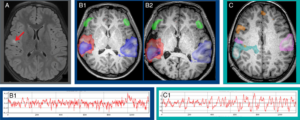Bio
“Resting State fMRI in Epilepsy for Seizure Onset Localization: Evidence and Methods”

Varina L. Boerwinkle, MD is the Division Chief of Child Neurology at the University of North Carolina in Chapel Hill, and Professor of Neurology. She is also the medical director of the Functional Neuroimaging and Neuroscience Laboratory and Pediatric Neurocritical Care Service. She earned her medical degree from University of Texas Southwestern and completed a residency in child neurology at Baylor College of Medicine.
Her clinical and research efforts in brain networks began in 2010. She pioneered the clinical utilization of resting state functional MRI (rs-fMRI) for children to localize seizure onset zones, and brain networks, and improve epilepsy surgery outcomes. Through her efforts, over 2000 individual children primarily with epilepsy have received rs-fMRI with clinically impactful results. For many of these children, who are unable to perform demanding tests reliably, rs-fMRI, analyzed by methods validated in her lab, offers comprehensive major brain network characterization with the capacity for clinical correlation.
▶RECORDING
Abstract
“Resting State fMRI in Epilepsy for Seizure Onset Localization: Evidence and Methods”

Epilepsy effects over 50 million worldwide and the only known cure is surgery. However, the success of the surgery relies on accurate localization of the seizure onset zone, which with standard techniques ranges 30-70%. Recently, resting state fMRI has been shown to not only show the normal networks to avoid surgical morbidity, but to also localize the seizure network. In this presentation we will review the evidence behind this new diagnostic and discuss potential avenue for future investigations. .
▶RECORDING